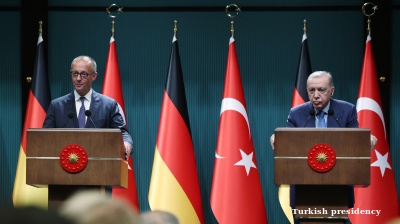Turkey appears to be facing two worrying squeezes on financing with MEPs having proposed on October 25 to cut Ankara’s EU pre-accession funds and Berlin reportedly working actively to cut funding from Germany’s state-owned KfW development bank, the European Investment Bank (EIB) and the European Bank for Reconstruction and Development (EBRD).
MEPs have recommended pre-accession monies for Turkey be reduced by €50mn with a further €30mn put in reserve in view “of the worrying deterioration of the situation as regards democracy, rule of law and human rights”, while, according to Bloomberg, those same concerns have led the German government to demand the financing institutions tighten their stance towards Turkey. The news service quoted officials as saying the three banks had imposed tighter restrictions, though not a formal freeze on funding, while some German commercial banks were reviewing their exposure to Turkey.
The situation will be watched closely by Ankara given that Germany is Turkey’s largest economic partner by a long way. The two countries’ bilateral trade amounted to more than $36bn last year.
“Turkey is not respecting freedom of speech, freedom of expression, human rights and is drifting further away from European democratic standards. We cannot pretend we don’t see that,” centre-right MEP Siegfried Muresan, who led the budget discussions, told Reuters.
He added that the pre-accession funding cuts would affect only money earmarked for political reforms, not funds for infrastructure and farming.
“We asked the European Commission to make recommendations on changing and reducing the pre-accession aid in a responsible way,” German Chancellor Angela Merkel told reporters on October 19 after the first day of an EU summit.
She described the development of democratic values and the situation in Turkey as “very negative”.
Despite Merkel's strong rhetoric, the German chancellor, however, did not call for an end to accession talks with Ankara.
The resolution adopted by MEPs read: “In view of the worrying deterioration of the situation as regards democracy, rule of law and human rights, decides to decrease the support for political reforms in Turkey; decides to put part of the remaining appropriations in reserve to be released when Turkey makes measurable improvements in the fields of rule of law, democracy, human rights and press freedom, with the aim of redirecting these funds to civil society actors for implementing measures supportive of these objectives.”
“They are talking about cutting or reducing pre-accession aid to Turkey. That does not mean anything. This is something which degrades the EU's credibility,” Turkey’s EU Minister Omer Celik told state-run news service Anadolu on October 25.
Turkey expected to receive €4.45bn from the EU in pre-accession funding in the 2014-2020 period, but so far both sides had signed deals worth €1.78bn, according to the minister.
The tensions between Ankara and Germany and Brussels can be seen as part of a wider rift involving Turkey and the West. Turkish and US officials are currently trying to resolve a diplomatic row that has seen the mutual suspension of non-immigrant visa services. The spat broke out after a staff member of the US embassy in Ankara was arrested for alleged involvement with the Gulenists that the Turkish government blames for the attempted coup that took place in July last year.
While relations with the West have frayed, Ankara has been growing closer to Moscow in the past year since the Turks and Russians settled their differences over the shooting down of a Russian fighter-bomber near the Turkish-Syrian border by the Turkish armed forces in late 2015.
News

US push to pressure Iran providing fresh incentive for trans-Caspian pipeline
Turkmenistan showing interest in the idea.

US–China soybean sales restart
According to Scott Bessent, US Treasury Secretary, the agreement marks a significant step towards restoring normalcy for American farmers.

Russia faces $50bn annual losses from oil sanctions as Lukoil exits international assets
Russia is expected to lose at least $50bn annually due to oil-related sanctions, as Moscow’s largest private oil producer Lukoil agrees to sell its international assets and Germany considers nationalising operations owned by state-run Rosneft.

Chicken and chips in Seoul - for Nvidia, Samsung and Hyundai
In a low-key fried chicken shop in southern Seoul, the leaders of Nvidia, Samsung Electronics and Hyundai Motor held an informal meeting on the evening of October 30.

.JPG)

